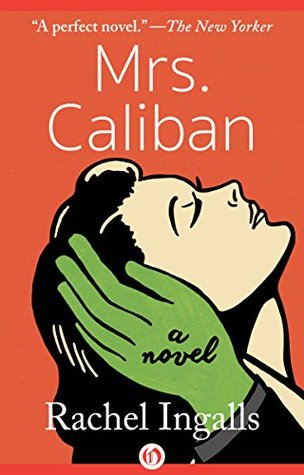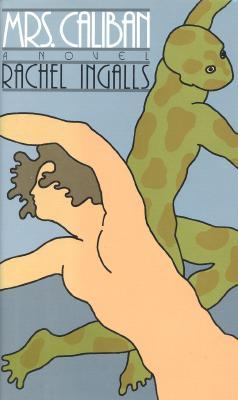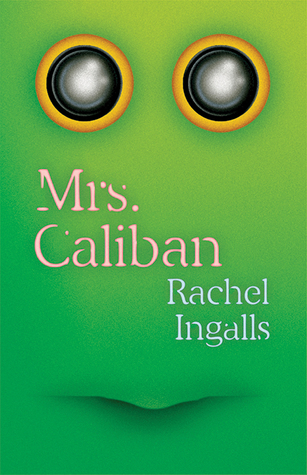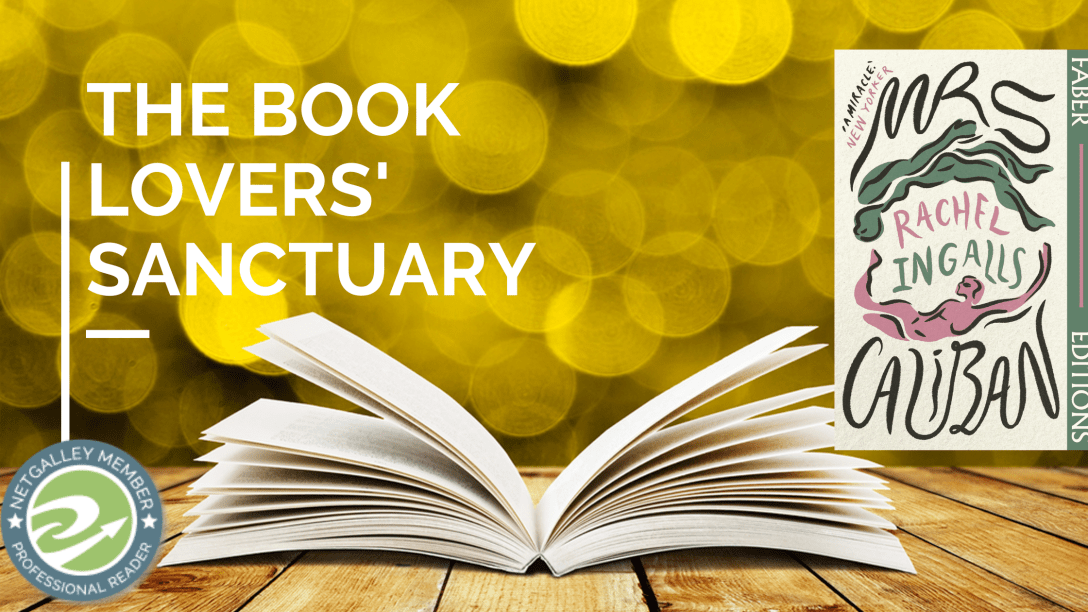
Dorothy is a grieving housewife in the Californian suburbs; her husband is unfaithful, but they are too unhappy to get a divorce. One day, she is doing chores when she hears strange voices on the radio announcing that a green-skinned sea monster has escaped from the Institute for Oceanographic Research – but little does she expect him to arrive in her kitchen. Muscular, vegetarian, sexually magnetic, Larry the frogman is a revelation – and their passionate affair takes them on a journey beyond their wildest dreams …
She had stopped, confused, and added, “But what people really want is to be happy.”
This is one of those books that I came to totally without expectations: a new colleague at work had suggested it to me, after our first proper conversation, and then brought it in for me the next day… and instantly, said colleague became friends. It was like books recommending people! She had cited the film The Shape of Water when trying to describe it, and used the word ‘ethereal’… Beyond that, I had no expectation.
And I found this wonderful!
And heartachingly sad and tender.
On the one hand, this could be read as a typical B-movie feature – and that is in no way a criticism! I love those old 1950s B-movies! Dorothy hears an announcement on the radio: a creature has escaped from a local facility; it is vicious and dangerous, having murdered its keepers. So far, so X-files.
But the prose thus far has been languid and calm, unruffled and it continues when
the screen door opened and a gigantic six-foot-seven-inch frog-like creature shouldered its way into the house and stood stock-still in front of her, crouching slightly, and staring straight at her face.
And this radio that has announced the mysterious escape – and I have always loved that trope which I remember fondly from Tom and Jerry cartoons, oddly! – has not been behaving itself for Dorothy before this. It has played or relayed messages for her which were not part of the programme, messages that no one else could hear…
Does Dorothy scream? Call for her husband who is literally in the next room? Does she grab a weapon to defend herself? No, she offers him food, recognises the fear and anxiety in his face and protects him… and gives him sanctuary in the spare room. That sanctuary becomes very quickly a sexual relationship, and Dorothy and the creature – whose name is wonderfully Larry, rather than the Institute’s melodramatic Aquarius the Monsterman – learn to co-habit and forge their own domesticity. Larry watches television during the day and car trips at night; Dorothy continues her routine, albeit with additional avocado purchases for Larry.
The routine is very cosy and intimate and – necessarily as Larry is being hunted – quiet and discrete, but the novel is so concise that it does not drag. Larry is increasingly taking risks, as he and Dorothy plan rather vaguely notions of taking him home to the ocean on the other side of America. Because the relationship, the love, between the two can only ever be temporary, as Dorothy’s relationships seem always to have been: her son died; the dog that was bought to distract her grief also died; her husband, Fred, is emotionally distant and cold and serially unfaithful; her friend Estelle is distracted by her own complicated love life – and, understandably, coffee.
Is Larry conjured up in response to these losses, to fill the void that Dorothy feels? What might it reveal about her that the phantasm she may have dreamt up is a seven-and-a-half foot tall frog-man?
Ingalls’ prose is wonderfully balanced and open: she never settles on any one interpretation but seems to leave every interpretation open to the reader. It is an extraordinarily deft balance. How can Larry be real and never suspected by Fred? How can Larry be anything other than real, when he appears to have committed acts of violence? Because, as we approach the climax of the novel, Larry’s risk-taking does end in violence and a final, tragic and somehow inevitable revelation for Dorothy.
But this is in no way a novel without its comedy – Larry’s attempts to disguise himself in glasses and a hat were delightful – or its moments of genuine tenderness. Larry and Dorothy’s walks along the beach, their conversations, their mutual empathy and sympathy for their respective traumas – and we learn that Larry was subjected to imprisonment, experimentation and physical and sexual abuse in the Institute from which he escapes.
“You must be lonely.”
“More than anything. More than hunger. Even hunger sometimes goes away, but this doesn’t.”
Ingalls, perhaps, stalls and falters at times with dialogue. The chats between Dorothy and Estelle, whilst frank and open, did not feel wholly authentic, whereas the stilted nature of the conversations Dorothy has with Fred – usually transactional and cold – worked beautifully to capture that calcified relationship… and yet even Fred is given a moment of connection, of vulnerability. Because, of course, he had lost a child too, and is as much a victim of his grief as Dorothy is, even if the tragedy is that his grief made him unavailable to Dorothy, that neither of them could manage or assuage each other’s grief or their own.
I can absolutely see why this book has stood the test of four decades: it is one of those novels that is so generously open to interpretation. The effect of trauma on relationships, the treatment of the ‘other’ and people who are different to us, mental health and perception… it also plays on and playfully subverts so many tropes so gloriously: that B-movie cliche of the lovers in the car at a make-out spot, as a beast roams the area, is twisted so that the alleged beast is the lover in the car!
That same openness and nuance also makes it a hard book to review… so I shall bring these ramblings to an end at this point! I loved it. It made me laugh and cry and think… and what more can you ask from a book?
What I Liked
- The humour, quirky, wry and delicate.
- The playfulness that the novel had with some of my favourite conventions and tropes
- The openness of interpretation: was Larry even real?
- The simplicity and lyricism of the language.
- The power of Dorothy’s grief, loss and loneliness.
What Could Have Been Different
- The dialogue felt a little stilted and unconvincing in places.
Alternate covers include










I would buy this for the cover alone! But because of your review I’ll actually make an effort to read it!
LikeLiked by 1 person
Aww thank you so much!
LikeLike
[…] Mrs Caliban, Rachel Ingalls […]
LikeLike
[…] Mrs Caliban, Rachel Ingalls […]
LikeLike
[…] Mrs Caliban, Rachel Ingrams: 128 pages […]
LikeLike